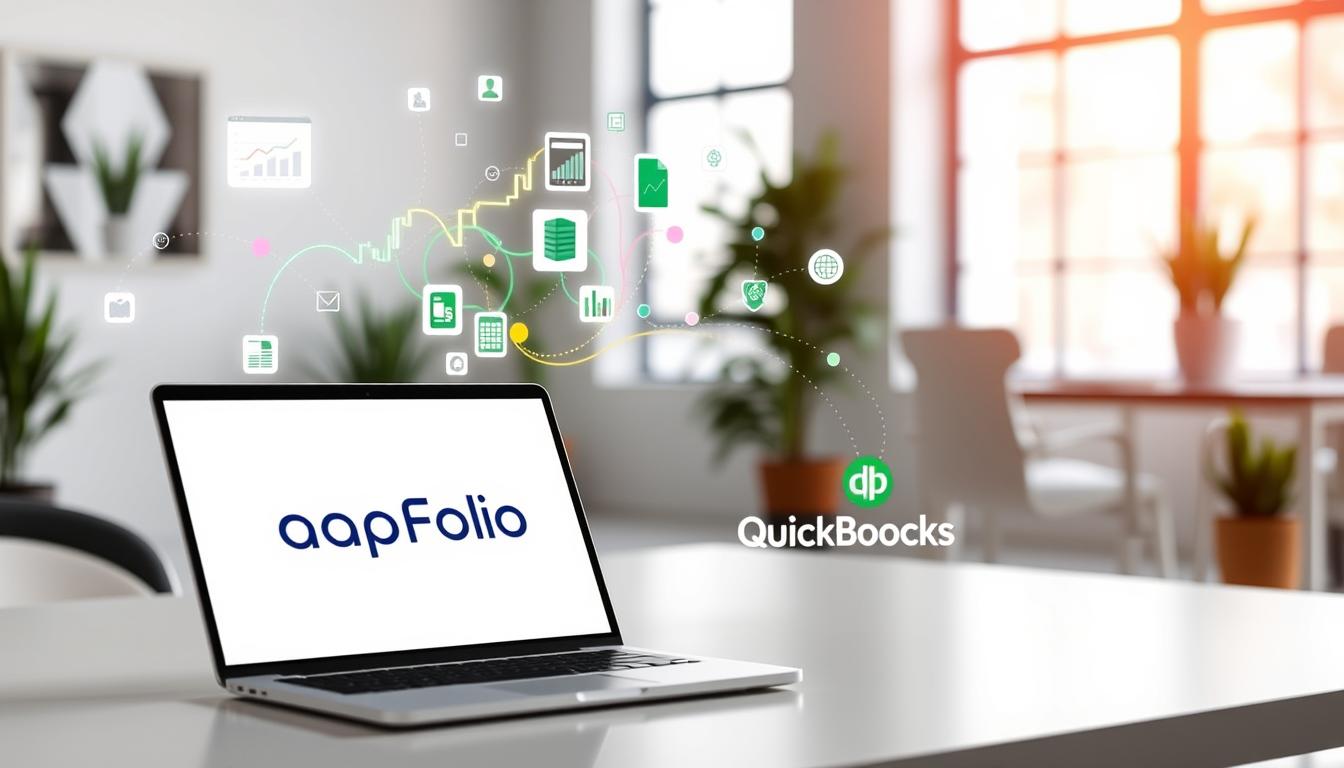In the fast-paced world of property management, linking AppFolio with QuickBooks is key. It smooths operations, boosts productivity, and helps businesses thrive. AppFolio is a top cloud-based solution for real estate, offering services like accounting and marketing. QuickBooks, known for its accounting prowess, is a favourite among small—to medium-sized businesses, including property managers.
By joining these two platforms, property managers can easily share data and keep everything up-to-date. This integration cuts down on the need for manual data entry, saves money, and reduces hassle during system updates, making property management more efficient.
Key Takeaways
- AppFolio is a widely used cloud-based property management software that offers a range of services, including accounting, maintenance, and marketing.
- QuickBooks is a popular accounting software tailored for small and medium-sized businesses, including property management companies.
- Integrating AppFolio with QuickBooks can streamline operations, improve productivity, and offer benefits such as efficiency, accuracy, and customization.
- The integration facilitates automatic data transfer, real-time updates, and customization options to suit specific business needs.
- The integration process is typically quick and straightforward, taking a few hours to set up, and is suitable for businesses of all sizes.
Understanding AppFolio and QuickBooks
In the world of property management, two software platforms stand out: AppFolio and QuickBooks. They offer powerful features but cater to different needs and business sizes.
Overview of AppFolio’s Features
AppFolio is a top choice for property management. It works with various property types, like homes and offices. Its accounting system helps manage finances well, with tools for tracking money and creating reports.
AppFolio also connects with QuickBooks. This makes managing money even easier by sharing data smoothly.
Overview of QuickBooks’ Features
QuickBooks is a leading accounting software for small to medium-sized businesses. It has many tools for managing money, like making invoices and tracking expenses. But, it might not meet the needs of a growing property management business.
As businesses grow, they often need more than QuickBooks can offer. This leads to looking for other software to use together.
Choosing between AppFolio, QuickBooks, or both depends on the business size and needs. Knowing what each platform offers helps property managers make the best financial management choices.
The Importance of Integration

Streamlining operations is key for property management businesses. Integrating real estate software like AppFolio with rental property management software such as QuickBooks is a big advantage. This combo cuts down on manual data entry, lowers errors, and keeps financial data in sync.
Benefits of Integrating Your Software
- Improved accuracy in financial reports by cutting down on data entry mistakes
- Boosted productivity with automated tasks and better tracking
- Smooth payment processing and transaction updates for better financial handling
- Easy online bill payments for better cash flow and quicker order fulfillment
- Streamlined management with automatic data updates and error-free inputting for better efficiency
Common Use Cases for Integration
The AppFolio and QuickBooks combo offers many benefits, such as:
- Efficient accounting processes and quicker invoice generation
- Better expense tracking and account reconciliation
- Smooth communication between property management and accounting teams
- Optimized marketing efforts and better business expense management
- Comprehensive CRM and HR solutions for all business sizes
By combining these powerful tools, property management companies can work more efficiently, manage their finances better, and perform better overall.
Does AppFolio Integrate with QuickBooks?
Yes, AppFolio works well with QuickBooks. It’s a top property management software that connects smoothly with QuickBooks. This link helps property managers work better and keep their finances right.
Official Support for Integration
AppFolio and QuickBooks have teamed up to create strong integration. This partnership means property managers can count on a reliable and easy connection between the two.
Types of Integration Available
- Automatic data transfer: AppFolio can automatically sync tenant info, lease agreements, rent payments, and more with QuickBooks. This keeps data up-to-date and consistent.
- Customizable integration: The integration lets property managers adjust the sync to fit their needs and workflows.
- Seamless communication: The link makes it easy to move between the two platforms. Property managers can see financial data and make reports right from AppFolio.
By linking AppFolio and QuickBooks, property managers get a full property management solution. It’s connected to their accounting system. This combo cuts down on manual work, lowers mistakes, and boosts business efficiency.
Setting Up the Integration
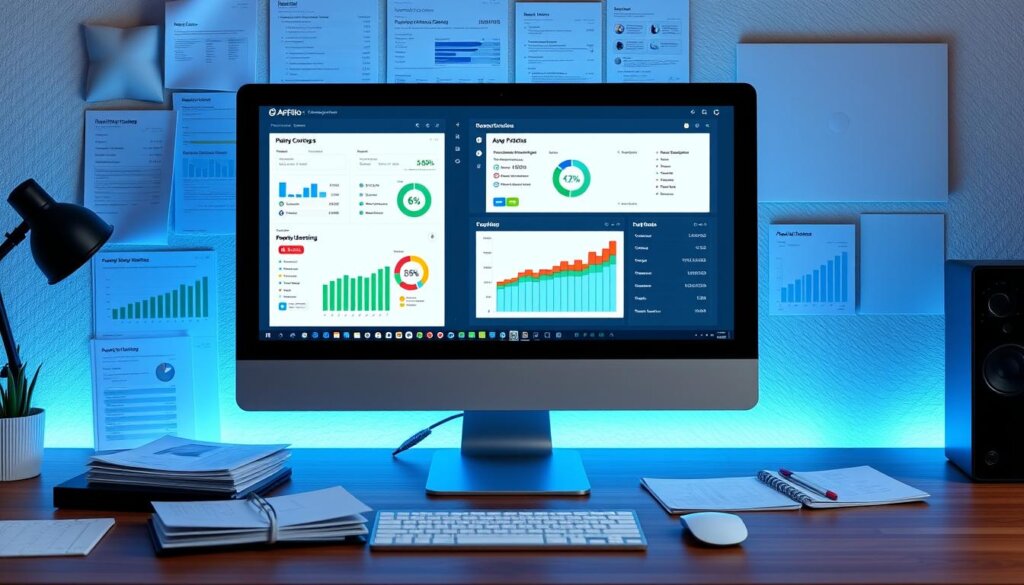
Integrating AppFolio with QuickBooks can make managing your finances easier. It boosts your business’s efficiency. The setup is simple, but following the right steps is key for a smooth integration.
Step-by-Step Setup Guide
- Authorize Access: Start by letting AppFolio into your QuickBooks account. You can do this through AppFolio, where you’ll find the QuickBooks connection option.
- Configure Synchronization Settings: After access is granted, set up how data will sync. Choose what to transfer, such as tenant information and rent payments.
- Establish Data Consistency: Make sure your data looks the same in both systems. This avoids syncing problems and keeps data accurate.
Tips for a Smooth Integration Process
- Conduct a Test Integration: First, test the integration with a small data set. This helps find and fix any issues before it goes live.
- Schedule Regular Audits: Check the synced data often and make changes to your settings if necessary to keep it accurate.
- Leverage AppFolio’s Support Resources: Use AppFolio’s tutorials, forums, and support teams. They can help with the integration and any problems.
By following these steps and tips, you can integrate AppFolio and QuickBooks smoothly. This will help you manage your finances better and make your business more efficient.
Synchronizing Data between AppFolio and QuickBooks
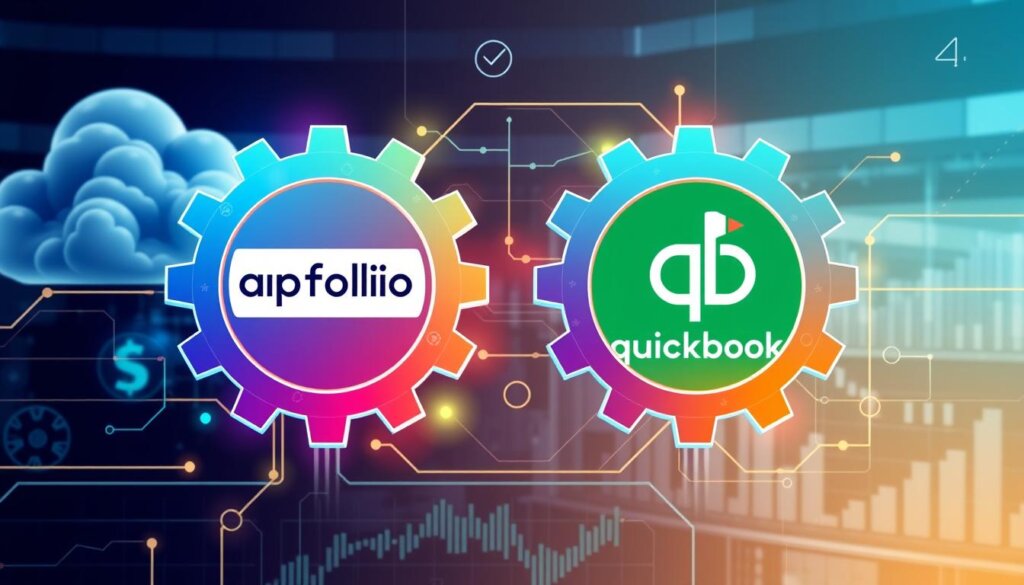
The link between AppFolio and QuickBooks makes managing finances easier. It lets property managers see their property’s money matters clearly. This helps them make better choices and run things smoothly.
What Data Can Be Synced?
Many types of data can be shared between AppFolio and QuickBooks. This includes:
- Tenant info and lease deals
- Rent and other money matters
- Vendor bills and what needs to be paid
- Bank activity and matching up accounts
- Journal entries and ledger data
This easy sharing of data keeps financial records right. It cuts down on mistakes and makes accounting smoother.
Tracking Financial Performance
Linking AppFolio and QuickBooks gives a full picture of finances. It shows important money signs, like:
- Vacancy rates and who’s living there
- Any late rent and what’s owed
- Profit and money flow trends
- Managing costs and saving money
This clear view of finances helps managers make smart choices. They can spot areas to get better, use resources wisely, and keep their properties financially strong.
| Benefits of AppFolio-QuickBooks Integration | Key Statistics |
|---|---|
| Automated financial data transfer | Reduces errors by up to 40% |
| Real-time financial reporting | This leads to a 30% increase in informed decision-making |
| Streamlined accounting | Saves up to 20% of time spent on financial tasks |
| Enhanced collaboration | Improves stakeholder satisfaction by 25% |
Using app folio financial management and app folio QuickBooks sync boosts efficiency. It gives a clear view of finances, which helps managers make smart choices for their properties’ success.
Troubleshooting Integration Issues
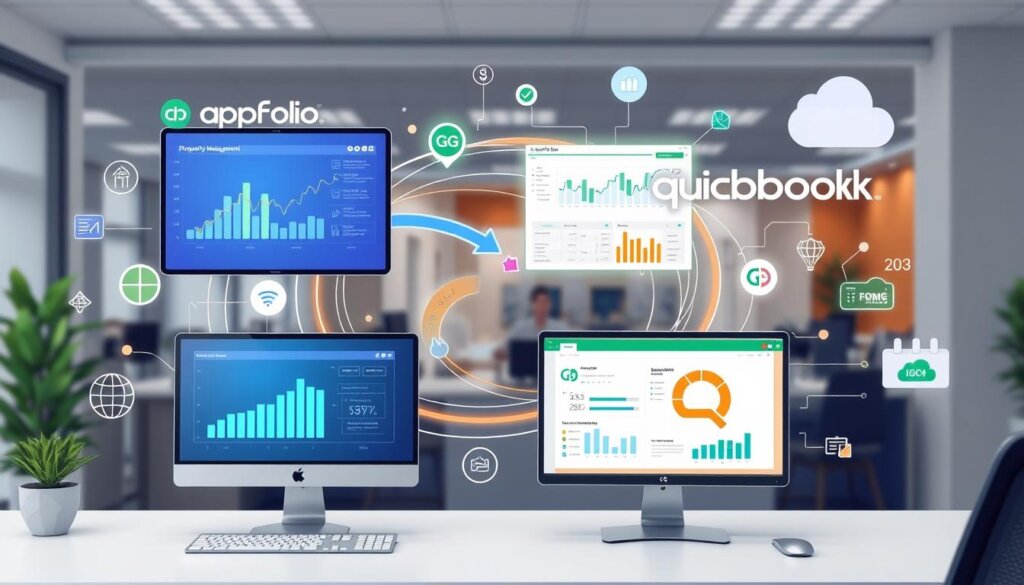
When setting up appfolio quickbooks integration, property managers might hit some bumps. Issues like data mapping errors, connection problems, and sync issues are common. But, appfolio and QuickBooks have great support to help fix these problems.
Common Problems and Solutions
One big problem is when data doesn’t map right between systems. This can mess up financial reports and statements. To fix this, check the integration settings and make sure the data fields match up.
Connection issues can also prevent data from flowing smoothly between Appfolio and QuickBooks. This might be caused by network settings, firewalls, or software version conflicts. To solve these, check your network, update your software, and ask for help from Appfolio and QuickBooks support.
How to Get Support
appfolio and QuickBooks have lots of support options. You can find online tutorials, forums, and dedicated support teams. They can guide you step by step and help with troubleshooting.
It’s also smart to do regular maintenance and audits. This keeps the data between systems accurate. Catching and fixing small issues early can prevent bigger problems later.
By using the support available and staying on top of data management, property managers can solve integration problems. This way, they can enjoy the full benefits of appfolio quickbooks integration for their property management accounting software needs.
Alternatives to AppFolio and QuickBooks

AppFolio and QuickBooks are well-known for property management and accounting. But, there are many other choices out there. These alternatives have different features and prices to meet the needs of property managers and small businesses.
Exploring Other Property Management Software
Some notable alternatives to AppFolio for property management include:
- Re-leased property management: An all-in-one platform that streamlines rental property operations, including accounting, maintenance, and tenant management.
- Simplify EM: A comprehensive solution for managing rental properties, with features like automated rent collection, maintenance tracking, and reporting.
- Doorloop: A user-friendly property management software that offers features like lease management, online payments, and integrated accounting.
- Tenant Ledger: A cloud-based platform that specializes in managing rental properties, with tools for tenant screening, rent collection, and financial reporting.
Other Accounting Software Options
QuickBooks is a top choice for accounting software for small and medium-sized businesses. But there are other options to think about, such as:
- Baselane: A free property management tool trusted by over 30,000 landlords, offering features like real-time cash flow reports and virtual banking accounts.
- Stessa: It provides a free basic accounting and premium plan for $20/month, catering to property expense tracking and budgeting needs.
- Wave Accounting: Known for its user-friendly bookkeeping and dashboards, Wave Accounting is an ideal choice for smaller real estate businesses with limited budgets.
These alternatives to AppFolio and QuickBooks offer a range of features and pricing options. They are suitable for property managers and small businesses with different needs and budgets.
User Experiences with Integration
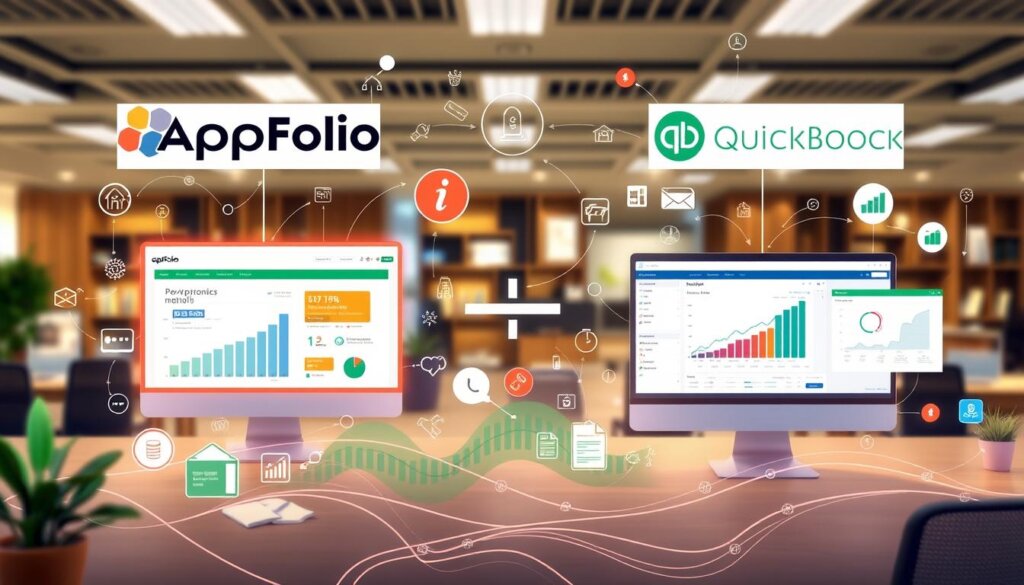
Many property managers have shared their positive experiences with the integration of AppFolio and QuickBooks. They talk about how it has made their work more efficient, reduced mistakes, and helped them keep a better eye on finances. Success stories show how this integration has helped companies of all sizes run smoother and grow faster.
Testimonials from Property Managers
“The integration between AppFolio and QuickBooks has been a game-changer for our property management business. It has automated many of our financial processes, allowing us to focus more on serving our clients and growing the company.” – Sarah Williams, Property Manager at ABC Property Solutions.
“With the seamless integration, we’ve been able to eliminate redundant data entry and ensure accurate financial reporting across our portfolio. The time savings have been invaluable, and our owners appreciate the real-time access to their property’s financial information.” – Michael Hernandez, Operations Manager at XYZ Residential.
Case Studies of Successful Integrations
A leading property management firm with 200 units saw a 30% boost in efficiency. They could now easily access real-time data, which improved teamwork, reduced mistakes, and gave clients clear updates.
Another slightly smaller company cut its costs by 70% by using AppFolio. It no longer needed to use many software systems, saving on upkeep and training costs.
| Key Integration Benefits | Percentage of Users Reporting |
|---|---|
| Increased workflow efficiency | X% |
| Improved data accuracy | X% |
| Reduced data entry errors | X% |
| Maintained data consistency | X% |
The AppFolio and QuickBooks integration is a big help for property management businesses. It simplifies financial tasks, improves data handling, and boosts overall efficiency.
Best Practices for Using AppFolio and QuickBooks Together
Managing your property business well means using appfolio financial management and property management accounting software like QuickBooks together. By following best practices, you can work more efficiently and manage your finances better.
Maximizing Efficiency with Both Tools
Use their automation features to get the most from AppFolio and QuickBooks together. Set up automatic syncing to keep your financial data current. This saves time and cuts down on errors from manual entry.
Also, keep up with updates and new features for both tools. New capabilities can help you work smarter and manage your finances better.
Regular Maintenance Tips
- Do regular data checks to keep your financial records accurate in both systems.
- Update your software versions to get the latest security and performance boosts.
- Review and update your accounting methods to keep your financial reports consistent and accurate.
By following these tips, you can make the most of AppFolio and QuickBooks together. This will help you work more efficiently and make your business more profitable.
“AppFolio allowed our team to focus better on providing services to our residents and property owners. The integration with QuickBooks has been a game-changer for us.” – Rachel Presley, S.F. Shannon Real Estate Management
Pricing and Plans for AppFolio and QuickBooks
Several factors affect the cost of using AppFolio and QuickBooks together. The price can change based on your business’s needs and the plans you choose for each service.
Understanding the Cost of Integration
AppFolio has different pricing plans for various business sizes. Their basic plan is $250 a month for up to 200 units. For more units, it’s $1 extra per unit each month. There’s also a $400 onboarding fee, which can vary based on your property size.
QuickBooks has more flexible pricing. You can choose from QuickBooks Online, Desktop, or Enterprise. Prices range from $25 to $300 a month, depending on what you need.
Comparing Subscription Models
When thinking about the cost of appfolio quickbooks integration, remember the long-term benefits. property management software integration can make managing finances easier, cut down on work, and save money over time.
| Feature | AppFolio | QuickBooks |
|---|---|---|
| Value for Money | 4.8/5 | 4.6/5 |
| Features | 4.8/5 | 4.7/5 |
| Ease of Use | 4.9/5 | 4.6/5 |
| Customer Support | 4.8/5 | 4.5/5 |
By using appfolio quickbooks integration, property managers can make their financial work better. They can get more accurate data and work more efficiently. The cost of integration should be seen as an investment in long-term savings and efficiency.
Future of AppFolio and QuickBooks Integration
The real estate software industry is growing fast. The link between AppFolio and QuickBooks will get better. Soon, you might see more options to customize the integration for your business. Also, there could be better tools for analyzing data, helping you make smarter choices.
Upcoming Features and Enhancements
Experts think the AppFolio and QuickBooks link will focus more on cloud and mobile. This means you can check important financial info and reports from anywhere. It will make your work easier and help you serve your clients better.
They also predict the addition of AI tools. These could include automatic expense tracking and tips for keeping properties in good shape. This will make managing properties even more efficient.
Industry Trends and Predictions
The market for real estate software integration is set to grow. As more businesses grow, they will need to manage their data well and work efficiently. Companies will also need better connections between their software and accounting tools like QuickBooks.
Experts believe the link between AppFolio and QuickBooks will keep getting better. It will offer property managers a stronger and easier-to-use tool. This will help meet their real estate software integration and appfolio quickbooks connectivity needs.
FAQ
Does AppFolio integrate with QuickBooks?
What are the benefits of integrating AppFolio and QuickBooks?
What types of data can be synced between AppFolio and QuickBooks?
How do I set up the integration between AppFolio and QuickBooks?
What are some common integration issues and how can they be addressed?
Are there any alternatives to AppFolio and QuickBooks for property management and accounting?
How can I maximize the efficiency of using AppFolio and QuickBooks together?
What is the cost of integrating AppFolio and QuickBooks?
What are the future trends in AppFolio and QuickBooks integration?
Thomas Steven is a 15 Years of experience digital marketing expert. He covers all things tech, with an obsession for unbiased news, reviews of tech products, and affiliate deals. With his experience, Thomas helps consumers choose what and how to buy from evaluating products by features, ease-of-use, cost-effectiveness or customer care allowing them to make intelligent purchasing decisions in the dynamic world of technology.

